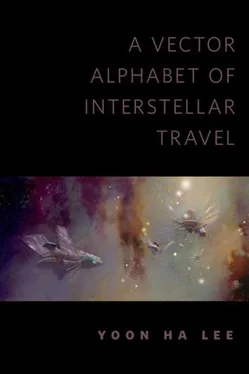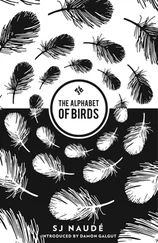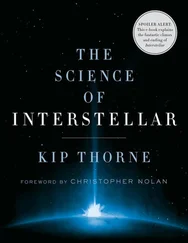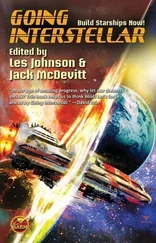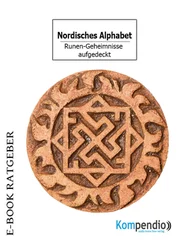Yoon Ha Lee
A VECTOR ALPHABET OF INTERSTELLAR TRAVEL

The Conflagration
Among the universe’s civilizations, some conceive of the journey between stars as the sailing of bright ships, and others as tunneling through the crevices of night. Some look upon their far-voyaging as a migratory imperative, and name their vessels after birds or butterflies.
The people of a certain red star no longer speak its name in any of their hundreds of languages, although they paint alien skies with its whorled light and scorch its spectral lines into the sides of their vessels.
Their most common cult, although by no means a universal one, is that of many-cornered Mrithaya, Mother of the Conflagration. Mrithaya is commonly conceived of as the god of catastrophe and disease, impartial in the injuries she deals out. Any gifts she bestows are incidental, and usually come with sharp edges. The stardrive was invented by one of her worshipers.
Her priests believe that she is completely indifferent to worship, existing in the serenity of her own disinterest. A philosopher once said that you leave offerings of bitter ash and aleatory wine at her dank altars not because she will heed them, but because it is important to acknowledge the truth of the universe’s workings. Naturally, this does not stop some of her petitioners from trying, and it is through their largesse that the priests are able to thrive as they do.
Mrithaya is depicted as an eyeless woman of her people, small of stature, but with a shadow scarring the world. (Her people’s iconography has never been subtle.) She leans upon a crooked staff with words of poison scratched into it. In poetry, she is signified by smoke-wind and nausea, the sudden fall sideways into loss.
Mrithaya’s people, perhaps not surprisingly, think of their travels as the outbreak of a terrible disease, a conflagration that they have limited power to contain; that the civilizations they visit will learn how to build Mrithaya’s stardrive, and be infected by its workings. A not insignificant faction holds that they should hide on their candled worlds so as to prevent Mrithaya’s terrible eyeless gaze from afflicting other civilizations, that all interstellar travel should be interdicted. And yet the pilgrims—Mrithaya’s get, they are called—always find a way.
Certain poets write in terror of the day that all extant civilizations will be touched by this terrible technological conflagration, and become subject to Mrithaya’s whims.
Alphabets
In linear algebra, the basis of a vector space is an alphabet in which all vectors can be expressed uniquely. The thing to remember is that there are many such alphabets.
In the peregrinations of civilizations grand and subtle, each mode of transport is an alphabet expressing their understandings of the universe’s one-way knell. One assumes that the underlying universe is the same in each case.
Codices
The Iothal are a people who treasure chronicles of all kinds. From early on in their history, they bound forest chronicles by pressing leaves together and listening to their secrets of turning worm and wheeling sun; they read hymns to the transient things of the world in chronicles of footprints upon rocky soil, of foam upon restive sea. They wrote their alphabets forward and backward and upside down into reflected cloudlight, and divined the poetry of time receding in the earth’s cracked strata.
As a corollary, the Iothal compile vast libraries. On the worlds they inhabit, even the motes of air are subject to having indices written on them in stuttering quantum ink. Some of their visionaries speak of a surfeit of knowledge, when it will be impossible to move or breathe without imbibing some unexpected fact, from the number of neutrons in a certain meadow to the habits of aestivating snails. Surely the end product will be a society of enlightened beings, each crowned with some unique mixture of facts and heady fictions.
The underside of this obsession is the society’s driving terror. One day all their cities will be unordered dust, one day all their books will be scattered like leaves, one day no one will know the things they knew. One day the rotting remains of their libraries will disintegrate so completely that they will be indistinguishable from the world’s wrack of stray eddies and meaningless scribbles, the untide of heat death.
The Iothal do not call their starships ships, but rather codices. They have devoted untold ages to this ongoing archival work. Although they had developed earlier stardrives—indeed, with their predilection for knowledge, it was impossible not to—their scientists refused to rest until they devised one that drank in information and, as its ordinary mode of operation, tattooed it upon the universe’s subtle skin.
Each time the Iothal build a codex, they furnish it with a carefully selected compilation of their chronicles, written in a format that the stardrive will find nourishing. Then its crew takes it out into the universe to carry out the act of inscription. Iothal codices have very little care for destination, as it is merely the fact of travel that matters, although they make a point of avoiding potentially hostile aliens.
When each codex has accomplished its task, it loses all vitality and drifts inertly wherever it ends up. The Iothal are very long-lived, but even they do not always survive to this fate.
Distant civilizations are well accustomed to the phenomenon of drifting Iothal vessels, but so far none of them have deciphered the trail of knowledge that the Iothal have been at such pains to lay down.
The Dancers
To most of their near neighbors, they are known as the dancers. It is not the case that their societies are more interested in dance than the norm. True, they have their dances of metal harvest, and dances of dream descending, and dances of efflorescent death. They have their high rituals and their low chants, their festivals where water-of-suffusement flows freely for all who would drink, where bells with spangled clappers toll the hours by antique calendars. But then, these customs differ from their neighbors’ in detail rather than in essential nature.
Rather, their historians like to tell the story of how, not so long ago, they went to war with aliens from a distant cluster. No one can agree on the nature of the offense that precipitated the whole affair, and it seems likely that it was a mundane squabble over excavation rights at a particular rumor pit.
The aliens were young when it came to interstellar war, and they struggled greatly with the conventions expected of them. In order to understand their enemy better, they charged their masters of etiquette with the task of interpreting the dancers’ behavior. For it was the case that the dancers began each of their battles in the starry deeps with the same maneuvers, and often retreated from battle—those times they had cause to retreat—with other maneuvers, carried out with great precision. The etiquette masters became fascinated by the pirouettes and helices and rolls, and speculated that the dancers’ society was constricted by strict rules of engagement. Their fabulists wrote witty and extravagant tales about the dancers’ dinner parties, the dancers’ sacrificial exchanges, the dancers’ effervescent arrangements of glass splinters and their varied meanings.
It was not until late in the war that the aliens realized that the stylized maneuvers of the dancers’ ships had nothing to do with courtesy. Rather, they were an effect of the stardrive’s ordinary functioning, without which the ships could not move. The aliens could have exploited this knowledge and pushed for a total victory, but by then their culture was so enchanted by their self-dreamed vision of the dancers that the two came instead to a fruitful truce.
Читать дальше
